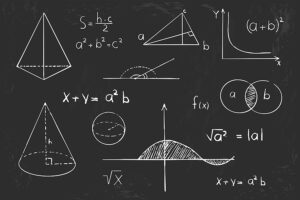Mathematics has long been vital to understanding how our world works. As a mathematics education major at Clark, you’ll study fundamental mathematics — such as algebra, trigonometry, geometry, and calculus — and also have the opportunity to shape the next generation of learners.


Why study mathematics education at Clark?
- Share your passion and enthusiasm for mathematics and problem solving with the next generation.
- Discover how math can be more than just working with numbers. Through teaching, you can combine your problem-solving skills with learning how to work with people, manage classrooms, become a facilitator, and find creative ways to impart knowledge.
- By studying education through a social justice lens — an integral part of the curriculum in Clark’s teacher education program — you’ll learn how to make a difference in the lives of students.
- Join a field where jobs are expected to be plentiful throughout the United States over the next several decades.
- Apply to our 4+1 Accelerated Master’s to obtain a master of arts in teaching (MAT) under a full scholarship.
4 + 1—An advanced degree within reach
The 4+1 Accelerated Master’s provides an opportunity to earn a pathway to a master’s degree — with one year of additional study and available tuition scholarships. Consider the following options for this major:
- Apply
- Request Info
Are you ready to take the first step?
Featured Courses

The Mathematics of Voting and Social Choice
Explore advantages and disadvantages of voting systems from a mathematical perspective as you investigate issues of polling, gerrymandering, and representation.

Differential Geometry
Describe spaces like surfaces, curves, and manifolds using this branch of mathematics that draws on advanced techniques in calculus and algebra, and has applications in physics, architecture, and economics.

Complexities of Urban Schooling
Examine the history, goals, and challenges of schooling in the U.S., particularly in urban communities, and learn how theory and policy affect student outcomes.
A total of eight courses, including six mathematics courses and two education courses, are needed to complete the mathematics major. You’ll also need to complete a capstone project through an education internship approved by your adviser. One-on-one faculty advising will help you plot a path through the major based on your beginning level of preparation and interests. Areas of focus are calculus, algebra, and teacher preparation.
If you’re considering a career teaching mathematics at the high school level, we encourage you to check out the Noyce Scholarship program.
At Clark you’ll get more than a great education; you’ll also be prepared for a long, productive career and life of consequence. And once you’ve completed your degree, you can join other Clark alumni who have gone on to work for great organizations and attend some of the best graduate schools in the world.
Non-Profit, Human Services, and Education
Science, Data, and Technology
Master of Arts in Teaching (MAT)
Under a full-ride scholarship, continue your studies in Clark’s intensive one-year Master of Arts in Teaching (MAT) Program and qualify for licensure.
The Clark Experience
The Clark Experience brings together the exceptional education you’ll receive in the classroom and so much more. Through focus and flexibility, it ensures you’ll leave Clark with the creativity, confidence, and resilience to succeed and lead a life of meaning and consequence.
Frequently Asked Questions
What can I do with a major in mathematics education?
At Clark you’ll get more than a great education; you’ll also be prepared for a long, productive career and life of consequence. And once you’ve completed your degree, you can join other Clark alumni who have gone on to work for great organizations and attend some of the best graduate schools in the world.
The mathematics major prepares you for graduate school as well as a wide range of careers in industry, finance, insurance, and public-school teaching.
What skills will I learn?
- How mathematics can be applied to nearly every aspect of modern life.
- Differentiation of algebraic and trigonometric functions, theorems, and various applications.
- How to identify and act upon the barriers and issues facing urban education.
What types of academic achievement awards are available to mathematics education majors?
Outstanding Achievement in Mathematical Education Award
Is there an honors program for mathematics education?
During your junior year, you might be accepted into the mathematics honors program. Joining the program means you’ll work closely with a professor to create a thesis on a topic of your choice. Examples of recent honors theses topics are:
- Visual Application of Group Theory
- Axiomatic Origami
- The Root System F4 and its A2 Subsystems
Be a force for change.
Come study at a small research university with a strong liberal arts core.

